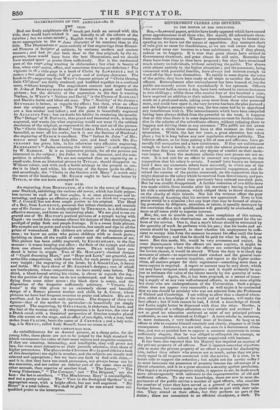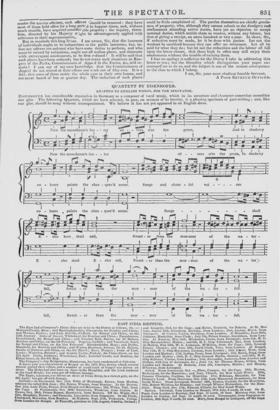1 GOVERNMENT CLERKS AND OFFICERS.
TO THE EDITOR OF THE SPECTATOR.
; several papers, articles have lately appeared which have caused f great apprehensions in all those who, like myself, fill subordinate situa- tions under Government. Whatever determination may be formed re- specting us, we have not the means of opposition. Any measures short of ruin give us cause for thankfulness, as we are well aware that they who grind away our incomes to a bare subsistence, can, if they please, reduce us to beggary. It is true that great abuses have existed in Government situations, and great abuses do still exist. Remedies for them have from time to time been proposed ; but they have occasioned much misery to individuals, without satisfying the public. The abuses exist almost entirely in the higher situations ; and the possessors, being connected with powerful families, have always had interest enough to ward off the blow from themselves. To satisfy in some degree the voice of the public, they have been ready at all times to sacrifice the inferior officers. Retrenchment after retrenchment has been boasted of, but the public are scarcely aware how scandalously it has operated. Officers who received half-a-crown a day, have been reduced in various instances to two shillings ; whilst those who receive four or five hundred a year, have acquired an addition to their salaries. Instead of reductions being made on a graduated scale, taking away most from those who possessed most, and could best spare it, the very reverse has been the plan pursued ; and the higher a person's salary was, the less cause had he to apprehend any interference with it. The retrenchments which have been compelled having been always shifted from the powerful to the weak, it happens that at this time there is in some departments no room for further reduc- tion in the salaries of the subordinate officers without reducing them to- beggary and driving them to any extremes. (The public are not aware how great a claim these classes have at this moment on their coin- miseration. Within the last few years, a great alteration has taken place ; but it is long before any new regulation obtains publicity. The inferior officers, so far from passing a life of ease and affluence, have ge- nerally full occupation and a bare subsistence. If they are unfortunate enough to have a family, it is only with the utmost prudence and eco- nomy that they can subsist with any degree of comfort on their mode- rate means. Even the moderate salaries they now possess are not se- cure. It is not safe for an officer to contract any engagement, on the supposition that his salary is certain. I myself have known an instance (and I dare say numerous others have occurred), in which one of the best officers in the service formed a matrimonial engagement, and ob- tained the consent of the parties concerned, on the supposition that he might depend on the salary which he received from Government, and par. titularly as it had a short time previously been reduced one-sixth part.
But he was cruelly disappointed. A further reduction of two-fifths more was made within three months after his marriage ; leaving to him and his wife a miserable pittance, which obliged them to throw themselves on the charity of their friends. Nor has the revenue officer the poor satisfaction of knowing that his services are appreciated. Even to him praise would be a stimulus ; but any hope that may be formed of obtain- ing promotion by diligence, attention, or talent, is speedily destroyed by the conviction that such qualifications will generally be overlooked, and must at all times yield to superior interest.
But, Sir, not to trouble you with more complaints of this nature,
allow me to offer a few observations on the modes suggested for the re- form of the service. One is, that a man's labour should be estimated by the quantity of work. he performs with his peel; that his books and ac- counts should be inspected, to show whether his employment be suffi- cient to occupy him from the moment he enters his office until the hour of his departure ; and that he should be paid for what he did, and no more. But this mode, Sir, would be very erroneous and unjust. In some departments where the officers are mere copyists, it might be properly acted upon ; but where the officers are somewhat higher than the lowest classes, it would be absurd. Where the duty is to check the accounts of others—to superintend their conduct and the general busi- ness of the office—to answer inquiries, and report to the higher autho- rities, all matters proper for their cognizance—something more than a mere copyist is required. A report or account may be very short, which yet may have occupied much attention ; and it would evidently be un- just to estimate the value of the labour merely by the quantity of writ- ing performed. Again, Sir, it has been proposed, as a means of insur- ing a supply of at any rate well-educated officers, to make none eligible but those who are undergraduates of the Universities. Such a propo- sition does not appear very reasonable ; as well might it be contended that no one should be minister who was not selected from the Professors of Oxford and Cambridge. I am willing to allow that a classical educa- tion, added to a knowledge of the world and of business, will make the best officer ; but if both cannot be had, I think a knowledge of Greek and Latin might better be dispensed with than the other. Besides, is the superiority of a college education so very certain and evident ? Is not as good an education conferred at most of our principal private academies, as can be obtained at College ? A mere scholar is, moreover, in most instances, a very inefficient man of business. So long as an officer is able to express himself concisely and clearly, elegance is of little consequence. ADDISON, we are told, was once in a Government situa. time, and was so puzzled how to express a common occurrence in terms sufficiently elegant, that he was obliged to relinquish the attempt, to one, less accomplished, indeed, but better acquainted with business. It has been also reported that his Majesty has required an account of the private property of all officers. Now it appears somewhat objection. able to make the private property of an officer a ground for discharging him, rather than others who possess not so much, unless they are pre- ciseiy equal in all respects connected with the service. It is true, he is better able to support the reduction ; but might not the service suffer ? In most instances the possession of property insures the advantage of a liberal education, and is in a great measure a security against peculation. The inquiry as to private property might, it appears to me, be made much more advantageously with reference to the superannuation of old and inefficient officers. To my own knowledge, there are now in most de. partments of the public service a number of aged officers, who consider the number of years they have served as a ground of exemption from further labour, but cannot make up their minds to part with their sala- ries. They attend at their offices-, but they perform no part of the duties ; these are committed to an efficient co-adjutor, a clerk. To render the service efficient, such of l'hhould be removed : they have
most of them held office for a long perio
..c1 in happier times, and, without much trouble, have acquired considerable property : the inquiry, there- fore, directed by his Majesty Wight be advantageously applied with reference to their superannuation.
But to conclude this long letter. I am aware, Sir, that the interests of individuals ought to be subservient to the public interests ; but, be- fore any officers are reduced who have some duties to perform, and who must be ruined by reductions, ought not all useless places, and sinecures with extravagant emoluments, to be first reduced ? It will be said that such places have been reduced; but do not many such situations as Ran- gers of the Parks, Commissioners of Appeal in the Excise, &c. still re- main ? I can say of my own knowledge,, that the Commissioners of Appeal do not attend at their offices one week out of fifty-two. It is a fact, that some of them reside the whole year at their own homes, and are never heard of but at quarter day. The reduction of such places could be little complained of. The parties themselves are chiefly gentle- men of property, who, although they cannot submit to the drudgery and eonflnement attending active duties, have yet no objection to accept nominal duties, which entitle them to receive, without any labour, but that of giving a receipt, an extra hundred or two a year. In short, Sir, if reduction must be made, let it be done with justice. Let not the weakest be sacrificed because they can offer no resistance. Let all be paid for what they do; but let not the reductions and the labour all fall upon the lower classes, thEit those high in office may still enjoy their emoluments without the trouble of earning them.
I fear no apology is sufficient fur the liberty I take in addressing this letter to you ; but the liberality which distinguishes your paper en- couraged me to do so, and the subject is one of the utmost consequence to the class to which I belong.
I am, Sir, your most obedient humble Servant, A POOR REVENUE OFFICER.



























 Previous page
Previous page